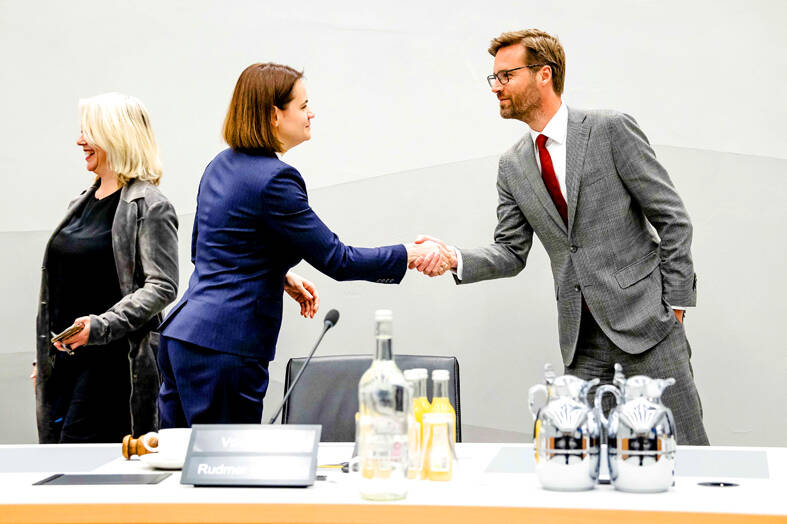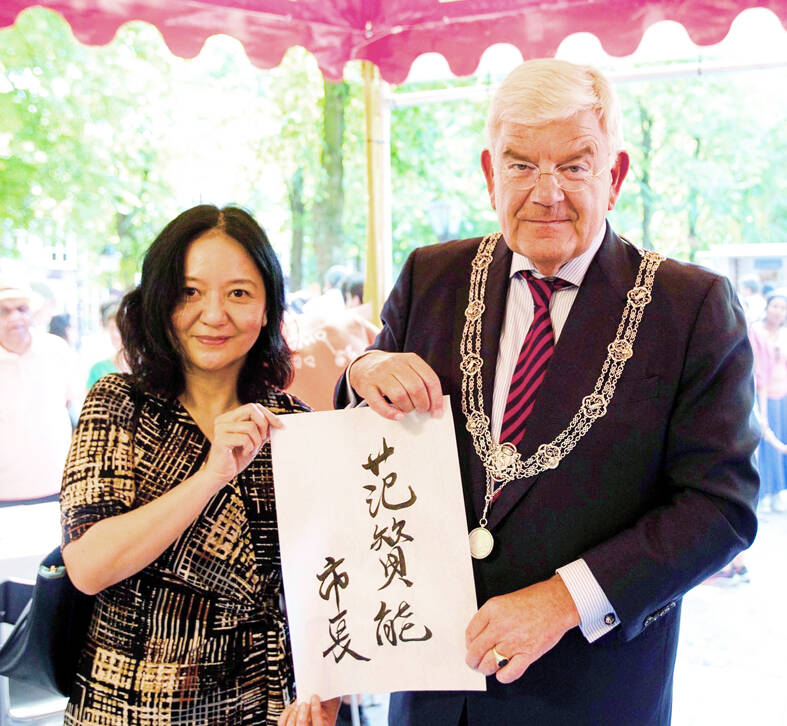The Ministry of Foreign Affairs yesterday thanked the legislature of the Netherlands after the Dutch House of Representatives passed two pro-Taiwan resolutions.
A resolution urging Amsterdam to use all possible means to enhance ties between Taiwan and the Netherlands and the EU passed the lower chamber of the Dutch Parliament with 129 yes votes and 21 no votes, the ministry said.
The resolution was jointly proposed by Dutch representatives Kees van der Staaij, who leads the Reformed Political Party, and Sjoerd Sjoerdsma of Democrats 66, who last month visited Taiwan as a member of a delegation from the Dutch Inter-Parliamentary Alliance on China, the ministry said.

Photo: EPA-EFE
Europe should learn from the lesson of the Russia-Ukraine war by standing in solidarity with democracies and checking aggression from authoritarian states, the ministry quoted Sjoerdsma as saying.
Another resolution proposed by Dutch Representative Wybren van Haga, leader of the Belang van Nederland Party, which called on Amsterdam to extend support for Taiwan by all possible diplomatic means, passed with a 145-5 vote count, the ministry said.
Van Haga expressed concern over rising tensions in the Taiwan Strait, the ministry said.

Photo courtesy of the Taipei Representative Office in the Netherlands via CNA
Taiwan and the Netherlands are partners with strong bilateral ties, and share the values of democracy, freedom and the rule of law, the ministry said.
Taiwan would continue to strengthen collaboration between the two nations on trade, the environment, health, technology and energy, including joint efforts to tackle challenges posed by international law enforcement, aviation safety and climate change, it said.
Taiwan has been and will remain a responsible member of the international community willing to work with like-minded countries, including the Netherlands, to promote freedom, stability and sustainable prosperity, it said.
Separately, Representative to the Netherlands Chen Hsin-hsin (陳欣新) thanked the Dutch lawmakers for passing the resolutions, “especially the friends of Taiwan who sponsored the bills.”
The Dutch House of Representatives has become increasingly critical of Beijing and friendly toward Taipei after China ramped up pressure on Taiwan, Algemeen Nederlands Persbureau BV news agency reported.
Last year, the legislative chamber said that China’s actions in Xinjiang amounted to “genocide against Uighurs.” This was despite the wishes of the Dutch government, which continues to refrain from using the phrase in connection with Beijing.
The Netherlands does not accept any continued escalation of regional tensions by Beijing or further acts of hostility directed against Taiwan, Dutch Minister of Foreign Affairs Wopke Hoekstra told lawmakers last week.
The House last year passed three resolutions that were supportive of Taiwan.
Last year’s resolutions urged the Dutch government to condemn any unilateral action taken by Beijing to change the cross-strait “status quo” and back Taiwan’s bid to return to Interpol, in addition to calling on the EU to support Lithuania in its decision to pursue ties with Taipei.

PREPAREDNESS: Given the difficulty of importing ammunition during wartime, the Ministry of National Defense said it would prioritize ‘coproduction’ partnerships A newly formed unit of the Marine Corps tasked with land-based security operations has recently replaced its aging, domestically produced rifles with more advanced, US-made M4A1 rifles, a source said yesterday. The unnamed source familiar with the matter said the First Security Battalion of the Marine Corps’ Air Defense and Base Guard Group has replaced its older T65K2 rifles, which have been in service since the late 1980s, with the newly received M4A1s. The source did not say exactly when the upgrade took place or how many M4A1s were issued to the battalion. The confirmation came after Chinese-language media reported

A Ministry of Foreign Affairs official yesterday said that a delegation that visited China for an APEC meeting did not receive any kind of treatment that downgraded Taiwan’s sovereignty. Department of International Organizations Director-General Jonathan Sun (孫儉元) said that he and a group of ministry officials visited Shenzhen, China, to attend the APEC Informal Senior Officials’ Meeting last month. The trip went “smoothly and safely” for all Taiwanese delegates, as the Chinese side arranged the trip in accordance with long-standing practices, Sun said at the ministry’s weekly briefing. The Taiwanese group did not encounter any political suppression, he said. Sun made the remarks when

The Taiwanese passport ranked 33rd in a global listing of passports by convenience this month, rising three places from last month’s ranking, but matching its position in January last year. The Henley Passport Index, an international ranking of passports by the number of designations its holder can travel to without a visa, showed that the Taiwan passport enables holders to travel to 139 countries and territories without a visa. Singapore’s passport was ranked the most powerful with visa-free access to 192 destinations out of 227, according to the index published on Tuesday by UK-based migration investment consultancy firm Henley and Partners. Japan’s and

BROAD AGREEMENT: The two are nearing a trade deal to reduce Taiwan’s tariff to 15% and a commitment for TSMC to build five more fabs, a ‘New York Times’ report said Taiwan and the US have reached a broad consensus on a trade deal, the Executive Yuan’s Office of Trade Negotiations said yesterday, after a report said that Washington is set to reduce Taiwan’s tariff rate to 15 percent. The New York Times on Monday reported that the two nations are nearing a trade deal to reduce Taiwan’s tariff rate to 15 percent and commit Taiwan Semiconductor Manufacturing Co (TSMC, 台積電) to building at least five more facilities in the US. “The agreement, which has been under negotiation for months, is being legally scrubbed and could be announced this month,” the paper said,